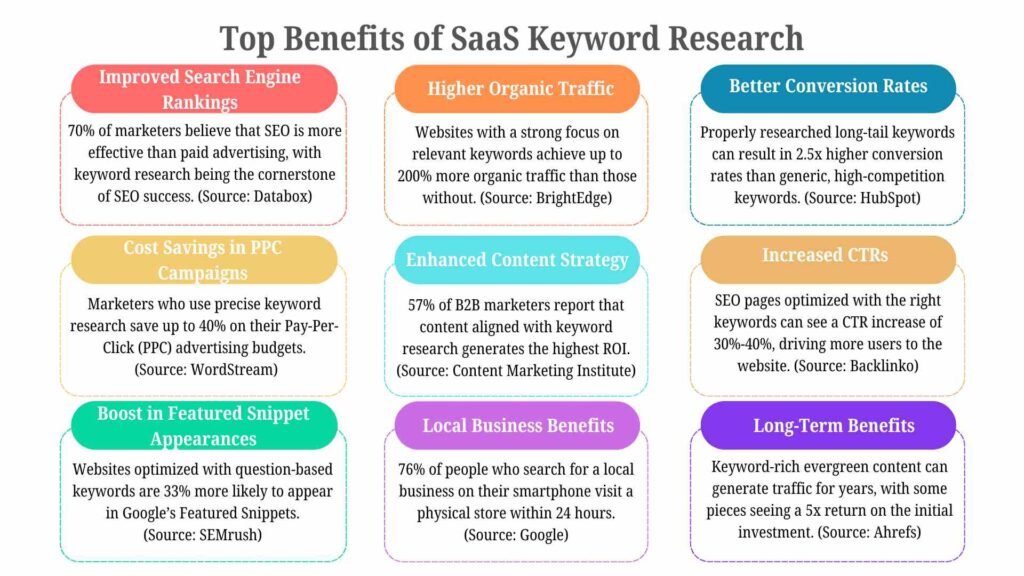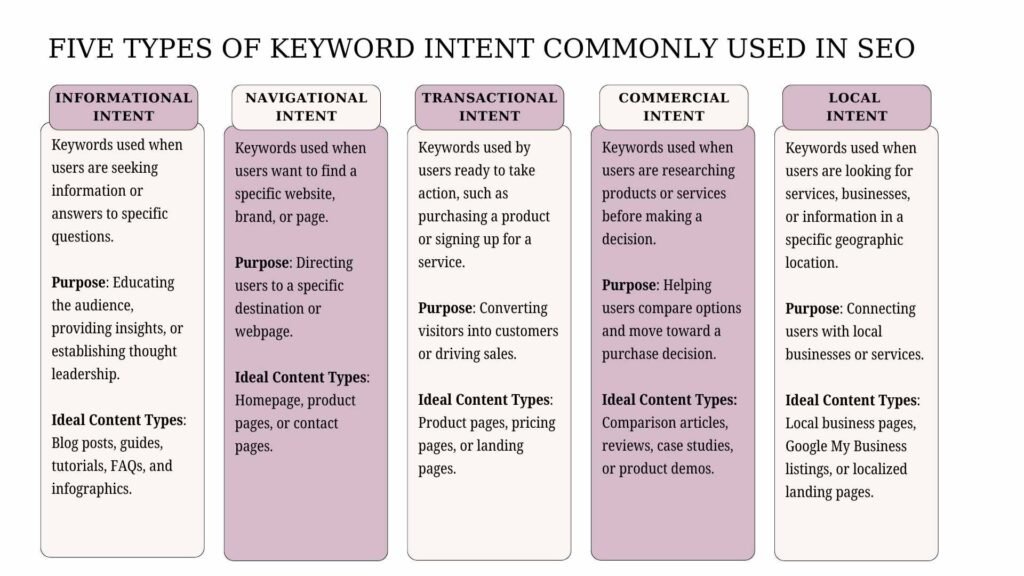SaaS Keyword Research: Overcoming Challenges for SEO Success
Let’s face it: SaaS keyword research can be tough.
Even for seasoned SEO professionals.
And here’s the kicker—it’s often a make-or-break aspect of your SEO strategy.
While many tools promise quick fixes, success isn’t as simple as entering a term and picking a keyword that looks appealing.
The real challenges lie in decoding search intent, evaluating keyword relevance, analyzing competition, adapting to the dynamic nature of search trends, and striking the perfect balance between search volume and conversion potential.
But don’t be discouraged.
Like most aspects of SEO, keyword research involves trial and error. It’s a continuous process that offers opportunities to fine-tune and improve your approach. That said, wouldn’t it be great to get those keywords right from the start?
In this blog, we’ll explore the essentials of SaaS keyword research, why it’s so important, and how to tackle its unique challenges. We’ll also touch on the nuances of keyword research for SaaS, giving you actionable insights to create a winning SEO strategy. Let’s get started!
Why is SaaS Keyword Research Important?
SaaS keyword research is the cornerstone of any successful online marketing strategy for SaaS businesses. It lays the groundwork for visibility on search engines like Google and Bing. But why is it so critical? Let’s break it down:
- Keywords Drive Search Engine Results: When someone enters a query on Google, they’re essentially using a keyword. Google’s algorithm scans its database in milliseconds to find the most relevant matches. Without the right keywords, your business could be missing out on potential leads.
- SEO Relies on Targeted Keywords: Businesses use keywords strategically in their SEO plans so search engines can connect them with users looking for specific products or services. Think of keywords as the bridge between your SaaS solution and the customer searching for it.
This is why choosing the right keywords isn’t just important—it’s essential. In essence, search engine optimization (SEO) is about making your website easily discoverable. With precise SaaS keyword research, you can ensure that search engine algorithms find and display your content in a split second, placing you in front of your ideal audience.
Top 10 Reasons Why SaaS Keyword Research is Vital
By prioritizing SaaS keyword research, you’re not just optimizing for search engines—you’re positioning your business for long-term growth and success. Let’s dive deeper into why SaaS keyword research is indispensable for your business.
- Understand Audience Needs: Learn what your audience is searching for.
- Create Targeted Content: Address your audience’s challenges directly.
- Improve Rankings: Rank higher on search engine results pages (SERPs).
- Increase Organic Traffic: Drive more visitors to your site naturally.
- Analyze Competitors: Uncover their strategies and gain an edge.
- Spot Keyword Gaps: Discover untapped opportunities for growth.
- Plan Content Better: Build a strategy around effective keywords.
- Make Informed Decisions: Use data insights to guide marketing efforts.
- Generate More Leads: Attract and convert the right audience.
- Stay Competitive: Keep up with trends and stay ahead in the market.

What Are Keyword Intents in SaaS Keyword Research?
In SaaS keyword research, understanding keyword intent is essential to crafting a successful content and SEO strategy. There are five main types of keyword intent: informational, navigational, transactional, commercial, and local. Each serves a specific purpose and influences how you structure your website and content. Let’s explore these intents and how to use them effectively:
1. Informational Intent: Users with informational intent seek answers to questions. They are at the top of the marketing funnel and are not ready to purchase yet. Their queries often include words like “how,” “what,” and “why.”
Actionable Tip: Create in-depth blog posts, tutorials, and how-to guides to provide value and establish your authority.
2. Navigational Intent: Navigational intent users know what they’re looking for and use keywords to locate specific websites, products, or pages, often including brand names in their searches.
Actionable Tip: Ensure your website is optimized with a user-friendly structure, clear navigation, and strong internal linking.
3. Transactional Intent: These users are ready to take action—whether it’s making a purchase or signing up for a service. Keywords include “buy,” “order,” “discount,” or “pricing.”
Actionable Tip: Optimize product and landing pages with strong calls-to-action, compelling visuals, detailed descriptions, and customer reviews.
4. Commercial Intent: Also called commercial investigation, these users are researching their options before deciding. They often search for terms like “best,” “top,” “reviews,” or “comparison.”
Actionable Tip: Publish comparison articles, buyer’s guides, reviews, and pros and cons lists to guide their decision-making.
5. Local Intent: Local intent focuses on users looking for nearby products or services, often using terms like “near me” or specific location names.
Actionable Tip: Optimize for local SEO by including local keywords, business location details, and region-specific content to attract these high-intent leads.
What Are Tails in SaaS Keyword Research?
Keyword intent is crucial in SaaS keyword research, but equally important are keyword tails—specifically, short-tail and long-tail keywords. While keywords are generally categorized as short, medium, and long tail, the focus for SaaS businesses lies in short and long-tail keywords due to their strategic significance.
Let’s compare them strategically:
Short-Tail Keywords – Key Differences
- Characteristics: 1-2 words, broad and general.
- Search Volume: High, with significant traffic potential.
- Competition: Extremely competitive, making it harder to rank.
Short-Tail Keywords Advantages
- High Traffic Potential: Ranking well can attract a large volume of visitors.
- Broad Reach: Builds brand visibility by appealing to a wide audience.
Short-Tail Keywords Disadvantages
- High Competition: Challenging to rank, especially for smaller SaaS businesses.
- Lower Conversion Rate: Broad audience means many users may not convert.
Long-Tail Keywords – Key Differences
- Characteristics: 3 or more words – specific and targeted.
- Search Volume: Lower than short-tail keywords.
- Competition: Less competitive, easier to rank for niche queries.
Long-Tail Keywords Advantages
- Higher Conversion Rate: Specific searches indicate users are closer to making a decision.
- Lower Competition: Easier to rank due to fewer competitors targeting these keywords.
Long-Tail Keywords Disadvantages
- Lower Traffic Potential: Limited search volume reduces overall traffic numbers.
- Narrow Reach: Attracts a smaller, highly specific audience, which may not support broader brand-building goals.

How to Choose the Best Keywords for SaaS
With hundreds, sometimes thousands, of keywords matching a single intent, the question remains: How do you choose the right ones?
For optimal SaaS keyword research, it’s not just about keyword intent or tails. You need to consider other key factors like:
- Difficulty: Can you realistically rank for the keyword?
- Search Volume: Is there enough interest in the keyword to justify targeting it?
- Trends: Are users consistently searching for it, or is its popularity declining?
- Relevance: Does the keyword align with your target audience’s needs?
These metrics play a vital role in driving traffic and generating leads. However, mastering keyword research isn’t something you achieve overnight—it’s a process that evolves with practice and insights. If you understand your audience, effectively use SEO tools, balance keyword intent, and prioritize relevance, you’re already ahead of the curve.
Ready to explore the deeper intricacies of SaaS keywords? Let’s dive in.
Key Metrics for Effective SaaS Keyword Research
Choosing the right keywords for your SaaS business involves analyzing specific metrics that ensure your efforts drive meaningful traffic and leads. Let’s break down the most important factors to consider:
- Search Volume: This metric indicates how often a keyword is searched each month. For small or new businesses, focus on keywords with search volumes between 50 and 1,000—these “low-hanging keywords” are easier to target and rank for.
- Keyword Difficulty: Keyword difficulty measures how hard it is to rank for a specific keyword. Focus on low-difficulty keywords to improve your chances of ranking, especially if you’re competing against established businesses.
- Trend Analysis: Keyword trends show how a term performs over time. Avoid keywords with declining popularity. While trend analysis isn’t the most critical metric, it helps you stay relevant and forward-looking in your SEO strategy.
- SERP Features: Search engine results page (SERP) features include: Featured Snippets, People Also Ask (PAA), Knowledge Graphs, Local Packs, and Images, Videos, News, and Shopping Results. Evaluate how keywords rank and choose those aligning with your marketing goals and content capabilities.
- Relevance: Relevance measures how closely a keyword matches user intent, expressed as a percentage (0% to 100%). Aim for higher percentages to ensure your chosen keywords resonate with your target audience.
- Cost Per Click (CPC): If you’re using Google Ads, CPC tells you the cost of targeting specific keywords. Focus on ranking organically for high-priority keywords to save on ad spend. However, some keywords may require a mix of paid and organic strategies for maximum impact.
- Competitor Analysis: Competitor analysis reveals the competition level for a keyword. Keywords with low competition are ideal for organic growth and ad campaigns, as ads tend to dominate SERPs before organic results.
Conclusion: The Power of SaaS Keyword Research
SaaS keyword research is not just important—it’s fundamental to your online success. It forms the backbone of search engines, enabling them to connect user queries with the most relevant content. By mastering keyword research, you can enhance your visibility on platforms like Google, directly connecting with your ideal customers.
Effective keyword research offers invaluable insights into your target audience’s needs and behaviors. By understanding what they’re searching for, you can create content that not only resonates with them but also boosts your organic traffic and improves your search engine rankings.
Choosing the right keywords isn’t a one-time task—it’s a strategic and ongoing process. It requires a deep understanding of your audience, smart use of SEO tools, and recognition of keyword intent. Balancing long-tail and short-tail keywords strategically, while always prioritizing relevance, ensures your efforts align with user intent.
By doing so, you’ll attract the right audience, strengthen your online presence, and position your SaaS business for sustainable growth and success. With the right keywords, you’re not just optimizing for search engines—you’re unlocking new opportunities to achieve your marketing goals.

